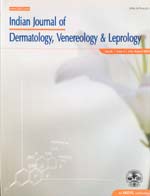
|
Indian Journal of Dermatology, Venereology and Leprology
Medknow Publications on behalf of The Indian Association of Dermatologists, Venereologists and Leprologists (IADVL)
ISSN: 0378-6323
EISSN: 0378-6323
Vol. 77, No. 1, 2011, pp. 37-41
|
 Bioline Code: dv11007
Bioline Code: dv11007
Full paper language: English
Document type: Research Article
Document available free of charge
|
|
|
Indian Journal of Dermatology, Venereology and Leprology, Vol. 77, No. 1, 2011, pp. 37-41
| en |
Correlates of human immunodeficiency virus (HIV) related knowledge among HIV infected people
Mahalakshmy, T.; Premarajan, K.C. & Abdoul, Hamide
Abstract
Background: The current adult prevalence of HIV in India is 0.34%. HIV infected persons should have adequate knowledge about the modes of transmission of infection. This is essential for reducing the risk of secondary infection, preventing coinfection from other viruses such as hepatitis B and for protecting the uninfected. Identification of the correlates of poor knowledge among HIV positive subjects will aid in planning effective measures to improve their health knowledge about HIV.
Aims: To explore HIV related knowledge among HIV positive subjects and to determine the correlates of their knowledge.
Methods: The study was conducted between November 2005 and May 2007. Two hundred HIV positive subjects attending a tertiary care hospital and three non-governmental organizations in Puducherry, South India, were recruited for the study. They were interviewed using a pre-tested structured questionnaire regarding their knowledge about HIV and were divided into those with HIV knowledge score >90% and those with score ≤90%. The data were analyzed using Chi-square test and logistic regression. Odds ratio (OR) and 95% confidence intervals were also calculated.
Results: The median knowledge score was 90%. Knowledge on the modes of HIV transmission was better than that on the modes by which it does not spread. Subjects who had received counseling (OR: 16.78), studied above class 10 (OR: 4.13), and those with duration of more than 1 year since diagnosis (OR: 3.12) had better HIV knowledge score (>90%). Persons counseled by HIV positive peers had a better knowledge.
Conclusion: This study revealed the importance of counseling in improving the HIV related knowledge among HIV positive individuals. It also highlights the beneficial effect of peer counseling.
Keywords
Counseling, HIV positive individuals, HIV related knowledge, peer counseling
|
| |
© Copyright 2011 Indian Journal of Dermatology, Venereology, and Leprology.
Alternative site location: http://www.ijdvl.com
|
|
